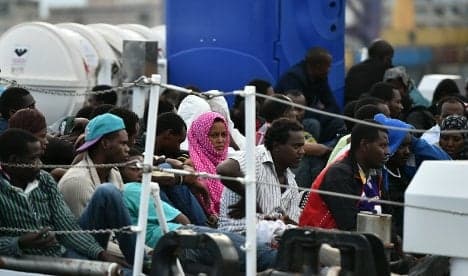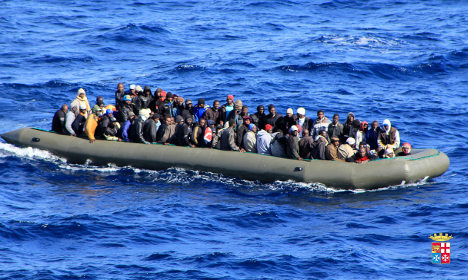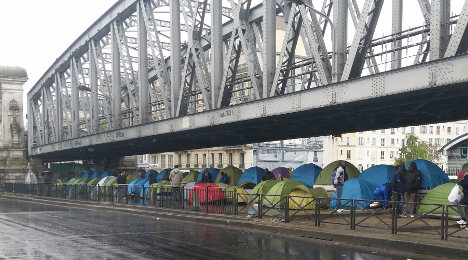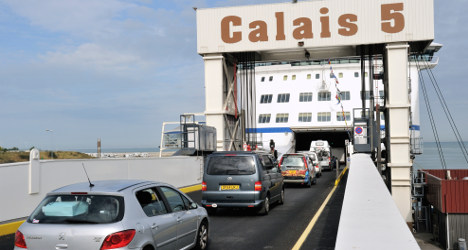EU tells France to open border to 9,000 migrants

The European Commission laid out on Wednesday its controversial emergency measure to relocate tens of thousands of migrants around Europe. France was asked to open its doors over 9,000 refugees over the next two years.
Despite opposition from France and other countries around Europe the Commission published on Wednesday details of how it plans to deal with the mass migration crisis facing Europe.
The headline measures, which will no doubt kick up a storm in some EU countries, features Brussels laying out plans for EU countries to open its doors to around 60,000 refugees - 40,000 who have arrived or due to arrive in Italy and Greece and another 20,000 from outside the EU.
“With today’s proposals the Commission is turning words into action and setting out immediate and long-term responses to the migration challenges that Europe faces,” read the commission’s statement.
The unprecedented emergency measure by Brussels will see 40,000 refugees (only 40 percent of the total of migrants arriving in Greece and Italy) that will make it to Italy and Greece in order to relieve the pressure on those two countries.

The Commission's mandatory relocation scheme which will apply to refugees from Syria and Eritrea, is only intended for those “in clear need of international protection” and will be put in place for two years.
With each country effectively given a quota, France has been told to take in 4,000 migrants fleeing Africa and the Middle East who have arrived in Italy and another 2,700 that have spilled across the border into Greece - meaning almost 7,000 in total.
That compares to Germany which has been set a quota of 8,700 from the two countries and Sweden which must take in around 1,300 migrants from Italy and Greece.
The quotas were worked out on a special calculation that looked at each country's population size, GDP, unemployment rate and the number of refugees it had already accepted.
SEE ALSO: Migrant camps spring up in heart of Paris

A financial incentive of €6,000 for each migrant has been offered to member states. Britain has already said it will exercise its right to opt out from the relocation scheme, and Ireland and Denmark are also expected not take part.
The proposals also include a second highly controversial measure to resettle an extra 20,000 migrants across Europe over the two years by giving them permanent protection in the form of asylum.
This measure will apply to refugees not yet inside the European Union, who may be living in camps in Turkey or Lebanon. This is expected to be on a voluntary basis.
When it comes to the Commission's resettlement plan, France’s quota has been set at 2,375 over the next two years - which will apply to those migrants most at risk identified by the UNHCR.
That compares to Germany's quota of 3,000 migrants and the UK's target of 2,300.
The Commission says €50 million is available to fund the resettlement of migrants around the continent.
First Vice-President Frans Timmermans said: “Everyone who needs sanctuary should find it in Europe. But those who have no justified claim should be quickly identified and returned to their home country. This is essential for migration policies to be well accepted in society."
Only last week French president François Hollande said he was against any kind of migrant quotas, echoing concerns raised in both Spain and the UK.
""People who come because they think that Europe is a prosperous continent, even when they are not hired by companies... must be escorted back, that's the rule," said Hollande.
"So one cannot talk of quotas, there can't be quotas for these migrants," he said, adding that quotas for "the right to asylum" would not make sense."
The commissions proposals also laid out its plans to tackle migrant smugglers, which include cooperating to highlight suspicious vessels and making sure traffickers cannot use social media to advertise their activities.

Comments
See Also
Despite opposition from France and other countries around Europe the Commission published on Wednesday details of how it plans to deal with the mass migration crisis facing Europe.
The headline measures, which will no doubt kick up a storm in some EU countries, features Brussels laying out plans for EU countries to open its doors to around 60,000 refugees - 40,000 who have arrived or due to arrive in Italy and Greece and another 20,000 from outside the EU.
“With today’s proposals the Commission is turning words into action and setting out immediate and long-term responses to the migration challenges that Europe faces,” read the commission’s statement.
The unprecedented emergency measure by Brussels will see 40,000 refugees (only 40 percent of the total of migrants arriving in Greece and Italy) that will make it to Italy and Greece in order to relieve the pressure on those two countries.

The Commission's mandatory relocation scheme which will apply to refugees from Syria and Eritrea, is only intended for those “in clear need of international protection” and will be put in place for two years.
With each country effectively given a quota, France has been told to take in 4,000 migrants fleeing Africa and the Middle East who have arrived in Italy and another 2,700 that have spilled across the border into Greece - meaning almost 7,000 in total.
That compares to Germany which has been set a quota of 8,700 from the two countries and Sweden which must take in around 1,300 migrants from Italy and Greece.
The quotas were worked out on a special calculation that looked at each country's population size, GDP, unemployment rate and the number of refugees it had already accepted.
SEE ALSO: Migrant camps spring up in heart of Paris

A financial incentive of €6,000 for each migrant has been offered to member states. Britain has already said it will exercise its right to opt out from the relocation scheme, and Ireland and Denmark are also expected not take part.
The proposals also include a second highly controversial measure to resettle an extra 20,000 migrants across Europe over the two years by giving them permanent protection in the form of asylum.
This measure will apply to refugees not yet inside the European Union, who may be living in camps in Turkey or Lebanon. This is expected to be on a voluntary basis.
When it comes to the Commission's resettlement plan, France’s quota has been set at 2,375 over the next two years - which will apply to those migrants most at risk identified by the UNHCR.
That compares to Germany's quota of 3,000 migrants and the UK's target of 2,300.
The Commission says €50 million is available to fund the resettlement of migrants around the continent.
First Vice-President Frans Timmermans said: “Everyone who needs sanctuary should find it in Europe. But those who have no justified claim should be quickly identified and returned to their home country. This is essential for migration policies to be well accepted in society."
Only last week French president François Hollande said he was against any kind of migrant quotas, echoing concerns raised in both Spain and the UK.
""People who come because they think that Europe is a prosperous continent, even when they are not hired by companies... must be escorted back, that's the rule," said Hollande.

Join the conversation in our comments section below. Share your own views and experience and if you have a question or suggestion for our journalists then email us at [email protected].
Please keep comments civil, constructive and on topic – and make sure to read our terms of use before getting involved.
Please log in here to leave a comment.